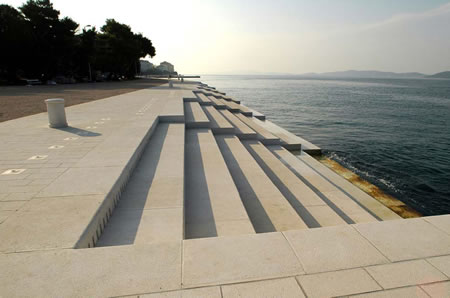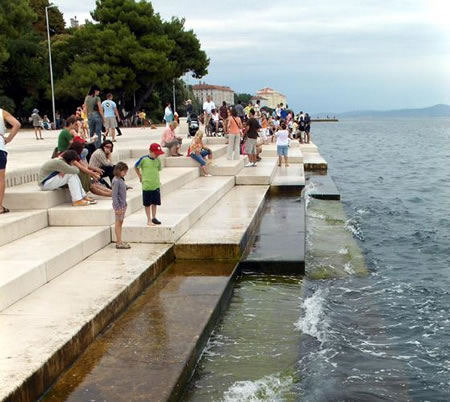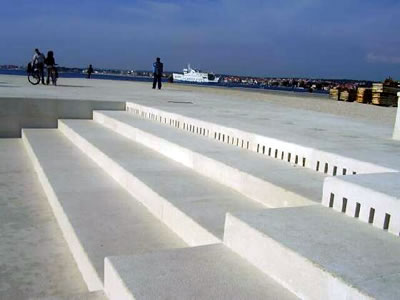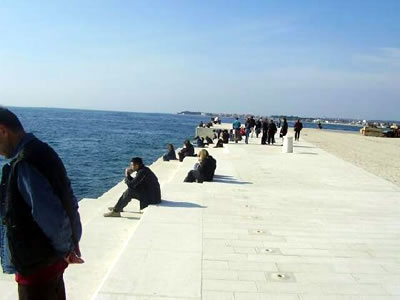The Sea Organ (morske orgulje) is located on the shores of Zadar, Croatia, and is the world's first pipe organ that is played by the sea. Simple and elegant steps, carved in white stone, were built on the quayside. Underneath, there are 35 pipes with whistle openings on the sidewalk. The movement of the sea pushes air through, and – depending on the size and velocity of the wave – musical chords are played. The waves create random harmonic sounds.
 The Sea Organ (morske orgulje) is seventy meters long with thirty-five organ pipes built under the concrete. The pipes are located so that the sea water and wind movements produce sounds that are heard by passers by so that it achieves a communication with nature and promotes a unity of architecture and environment. As sea forces and energies are unpredictable in terms of tides and winds, this organ offers never-ending concert of numerous music variations in which the performer is nature itself.
The Sea Organ (morske orgulje) is seventy meters long with thirty-five organ pipes built under the concrete. The pipes are located so that the sea water and wind movements produce sounds that are heard by passers by so that it achieves a communication with nature and promotes a unity of architecture and environment. As sea forces and energies are unpredictable in terms of tides and winds, this organ offers never-ending concert of numerous music variations in which the performer is nature itself.This masterpiece of acoustics and architecture was created by expert Dalmatian stone carvers and architect Nikola Basic in 2005, who recently received the European Prize for Urban Public Space for this project. Many tourists come to listen to this unique aerophone, and enjoy unforgettable sunsets with a view of nearby islands. Famed director Alfred Hitchcock said that the most beautiful sunset in the world can be seen from precisely this spot on the Zadar quay. That was how he described it after his visit to Zadar, a visit he remembered throughout his life by the meeting of the sinking sun and the sea.
 Each organ pipe is blown by a column of air, pushed in turn by a column of wave-moved water, through a plastic tube immersed into the water. The pipes' sound emanates to the surroundings through apertures in the vertical planes of the uppermost stairs. The 7 successive groups of pipes are alternately tuned to two musically cognate chords of the diatonic major scale. The outcome of played tones and/or chords is a function of random time and space distribution of the wave energy to particular organ pipes.
Each organ pipe is blown by a column of air, pushed in turn by a column of wave-moved water, through a plastic tube immersed into the water. The pipes' sound emanates to the surroundings through apertures in the vertical planes of the uppermost stairs. The 7 successive groups of pipes are alternately tuned to two musically cognate chords of the diatonic major scale. The outcome of played tones and/or chords is a function of random time and space distribution of the wave energy to particular organ pipes.  Air Holes along the top row of steps let the Sea Organ breathe in air to be transformed into musical sounds as the next wave plays its song. Below, the sound apertures are visible along the center of the walkway.
Air Holes along the top row of steps let the Sea Organ breathe in air to be transformed into musical sounds as the next wave plays its song. Below, the sound apertures are visible along the center of the walkway. In this part of Croatia the prevailing musical tradition is the spontaneous four-voice male singing, with melodies and chords conforming to the diatonic major scale. The 5 pipes of each section are arranged in 1.5 meter spacings. A listener, standing or sitting on a chosen point on the scalinade, should be able to hear 5 to 7 pipes. Thus, whole five-pipe sections are tuned to one chord. The citizens of Zadar are extremely proud of the first organ driven by the sea waves ever to be constructed. This installation, absolutely unique in the world, was designed to let people enjoy the point where the medieval town of Zadar embraces the Adriatic.
In this part of Croatia the prevailing musical tradition is the spontaneous four-voice male singing, with melodies and chords conforming to the diatonic major scale. The 5 pipes of each section are arranged in 1.5 meter spacings. A listener, standing or sitting on a chosen point on the scalinade, should be able to hear 5 to 7 pipes. Thus, whole five-pipe sections are tuned to one chord. The citizens of Zadar are extremely proud of the first organ driven by the sea waves ever to be constructed. This installation, absolutely unique in the world, was designed to let people enjoy the point where the medieval town of Zadar embraces the Adriatic.Thanks to the Sea Organ project, the inhabitants of Zadar have been restored once more to their relation with the sea. Chaotic reconstruction work undertaken in an attempt to repair the devastation Zadar suffered in the World War II turned much of the sea front into an unbroken, monotonous concrete wall. Now, the inviting white marble steps lead down to the water. Concealed under these steps, which both protect and invite, is a system of polyethylene tubes and a resonating cavity that turns the site into a huge musical instrument, played by the wind and the sea.
The hidden structure of the Sea Organ, and the tuning scheme, detailing the chords and musical notes played by the sea

{Source}
